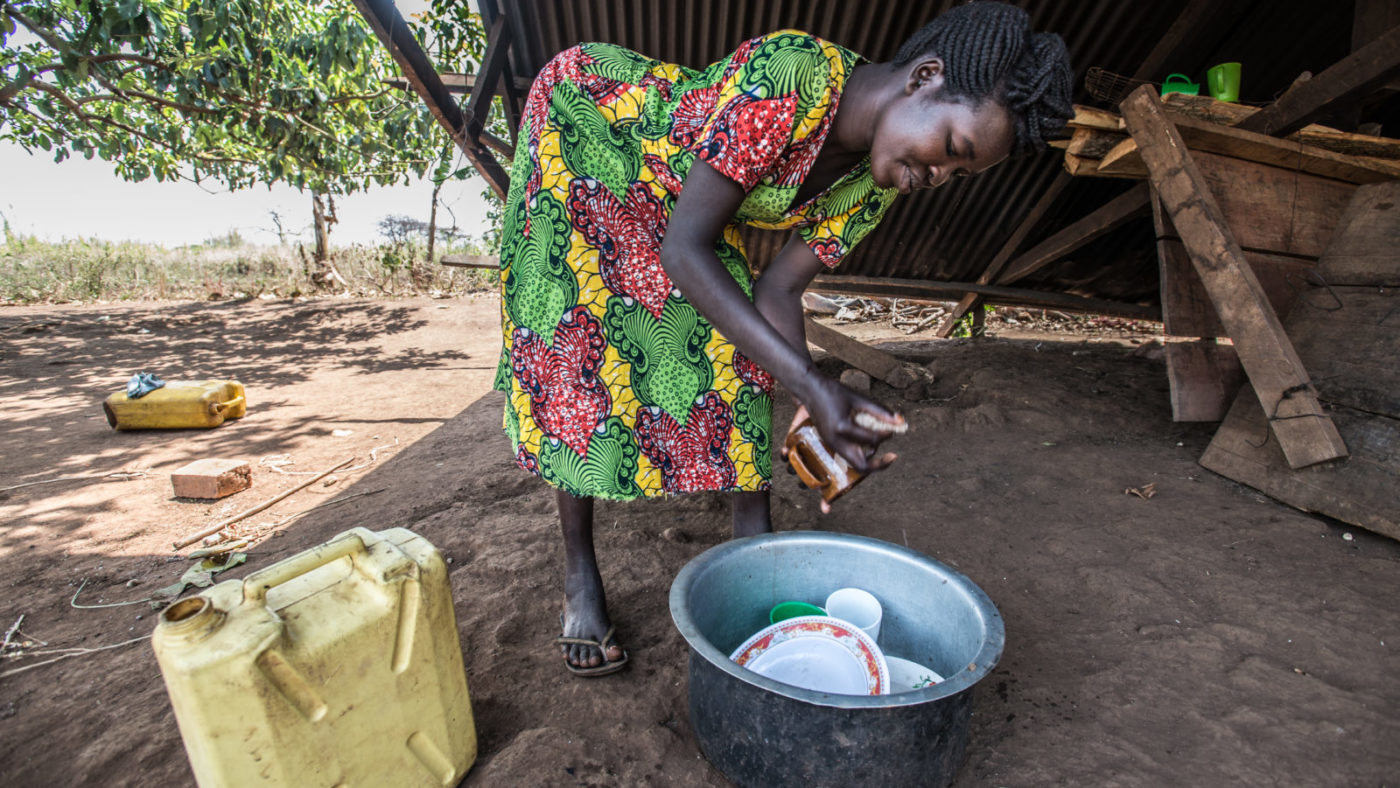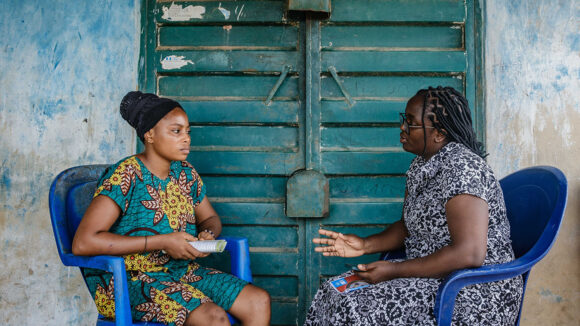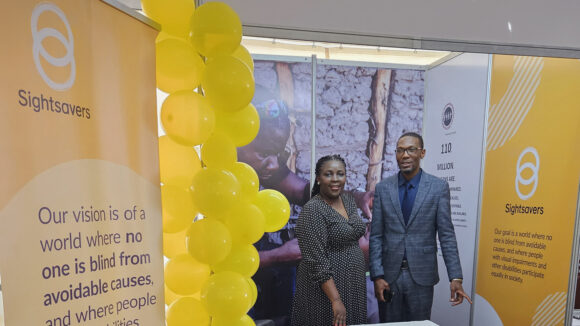Lots of people are taking to Twitter in these uncertain times to share resources and offer support. On Monday 6 April, Sightsavers joined the #DisabilityC19 Twitter chat to share our knowledge and discuss the impact of the COVID-19 outbreak on people with disabilities.
The chat was run by ARISE, a project which improves healthcare provision across informal settlements. Like Sightsavers, they are concerned that many at-risk groups – such as those with disabilities and chronic conditions – will suffer greater consequences as a result of the COVID-19 pandemic. The chat sparked lots of thought-provoking conversations about the greater risk people with disabilities face, how to make the global response more inclusive and the impact on daily life for people with disabilities.
The only way that we can fight COVID-19 is if we all ensure that we leave no one behind; people with disabilities and long-term health conditions are a vital part of ensuring that we can collectively do that. In case you missed it, here are some of the main points that came out from the conversations.
Increased risk for people with disabilities
We know that older people and those with pre-existing health conditions such as asthma, diabetes or heart disease, fall into a greater risk group for contracting the virus and are likely to have more severe symptoms if they get ill. Many people with disabilities also have underlying health conditions and face higher risks due to the barriers they face in society. For example, handwashing facilities might not be accessible and living in isolation may be impossible for someone who relies on others to help them with their daily needs. @JosephEtyang7, a deaf health worker from Kenya, pointed out that there is lack of accessible information, education and communication in signed languages, braille, pictorials and plain language. Others highlighted the difficulties of those with intellectual and psychosocial disabilities in accessing healthcare information.
A2: As pointed out by @SR_Disability “social distancing and self-isolation, may be impossible for those who rely on the support of others to eat, dress and bathe” #DisabilityC19 #COVID19
— Humanity & Inclusion UK (@HI_UK) April 6, 2020
https://twitter.com/estherangulu/status/1247107680075907072?s=20
Including people with disabilities in the global response
It’s essential that we listen to people with disabilities so we know how to respond in a useful, inclusive way.
It’s also crucial that data collected on the disease is disaggregated by groups such as age, sex and disability so that we can build a clear picture of how the disease is impacting different groups.
https://twitter.com/annalouruddock/status/1247112318959435778
A3: Some people with #disabilities are at higher risk of contracting #COVID19 due to underlying impairments. But we are receiving info on discriminatory treatment of persons w #disabilities when accessing emergency services. Their lives are NOT less of a priority. #DisabilityC19
— International Disability Alliance (IDA) (@IDA_CRPD_Forum) April 6, 2020
A3: Guess who’s best placed to talk about, with, and on behalf of people with disabilities? ?
?? People with disabilities.
If you want #Covid19 messaging to be inclusive, ensure people with disabilities and their organisations are at the decision making table! #DisabilityC19
— Andrea Pregel (@A_Pregel) April 6, 2020
Stigma and discrimination
Across the world, people with disabilities face stigma and discrimination in their daily lives. Now, we are beginning to see how the outbreak is exacerbating this. Accessing support and care is harder for people with disabilities and with many countries now on lockdown, lots of people are finding that their previous support has diminished. Stigma could also worsen a person’s chances of receiving medical assistance and recovering from the disease.
#disabilityc19 in people with hearing loss, lip reading is the most common way of communication, which will be hampered when caregivers are wearing masks. Providing deaf-spefic training is very crucial.@AktarBachera@sallytheobald @PamojaUK @oooppu046
— Ateeb Ahmad Parray (@AteebParray) April 6, 2020
An essential but often overlooked component is adequate knowledge and appropriate training for medical staff (all tiers) on accessibility, attitudes and knowledge about disabilities-goes a long way in providing safe, appropriate health services #DisabilityC19 and A5
— Shubha Nagesh (@snagesh2) April 6, 2020
Education
There are also fears that the pandemic could have long-term negative impacts on education. School-age children with disabilities frequently face exclusion and discrimination in the classroom and now, if their education is not prioritised, there is a danger that they may miss out entirely.
A6: Adequate and sustained financing for inclusive education is needed during, and after, #COVID19 outbreak and specific actions needed to ensure that the most marginalised children are effectively included and supported to return to school when schools re-open #DisabilityC19
— IDDC (@iddcconsortium) April 6, 2020

Available tools and resources
There is a wealth of resources and information being produced, disseminated and collected by various organisations around the world. Here are some recommendations:
- WHO has produced a set of disability considerations during the Covid-19 outbreak
- The United Nations have published a Global humanitarian response plan on Covid-19, which includes guidance on the inclusion of people with disabilities
- The International Disability Alliance (IDA) has produced a set of recommendations to include people with disabilities in the global Covid-19 pandemic response. IDA has also written an open letter to Dr. Tedros Adhanom Ghebreyesus, WHO Director-General, who committed to ensure people with disabilities are not left behind in the response.
- The International Disability and Development Consortium and CORE Group have produced a repository of resources on Covid-19 and disability. The repository includes a comprehensive list of materials in easy read, sign languages, statements from various governments, multilaterals and civil society organisations, research publications and media articles.
Author
 Andrea Pregel
Andrea Pregel
Andrea is a programme adviser at Sightsavers and is based in the UK.
Want to read more about our work?
Our inclusion work
Why community collaboration is important in our research
Our research on female genital schistosomiasis has highlighted the need to establish a safe and supportive environment for participants when studying sensitive topics.

The key to inclusive education is engaging organisations of people with disabilities
Collaborating with organisations of people with disabilities (OPDs) on our inclusive education projects has earned the Sightsavers-led Inclusive Futures consortium a Zero Project Award in 2024.

Six takeaways from the International Conference for Public Health in Africa
Sightsavers’ Hortance Manjo shares insights from the event in Zambia, which highlighted eye health for the first time.